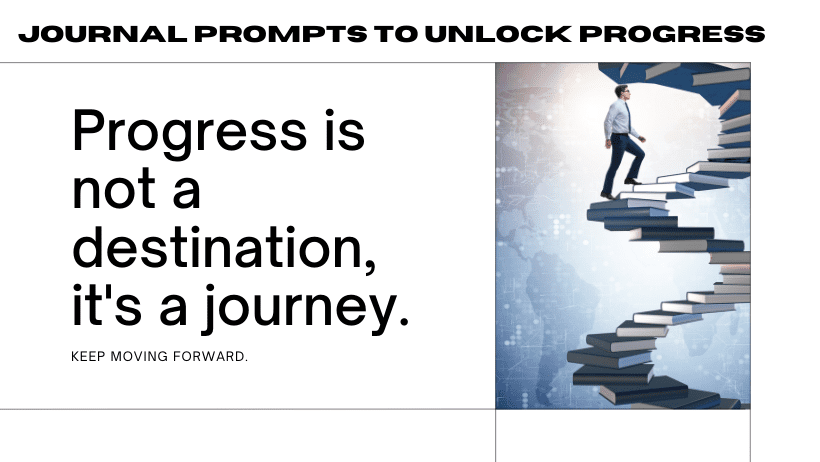Feel like you can’t make progress in life? It’s all too easy to feel like you’re stuck in a rut, watching as days blend into weeks with little to no personal growth or progress. This sense of stagnation can be discouraging, feeding into a cycle of negativity that hampers your ability to make progress. However, one remarkably effective strategy to break this cycle is through the power of journaling. Specifically, using journal prompts designed to challenge your thinking, inspire reflection, and unlock your potential. By dedicating time to unpack your thoughts and feelings, you’ll discover avenues for growth and development that were previously obscured by the fog of daily routine or negativity.
18 Journal Prompts To Help You Get Unstuck From No Progress In Life
1. Identify life’s peak moments this week – why were they impactful?
Reflecting on these instances of peak moments provides valuable insight when you’re feeling stuck. Noticing these moments of true engagement and life can help pinpoint patterns or activities that bring a deep sense of satisfaction and purpose.
This awareness allows you to deliberately choose how you spend your time and energy, guiding you towards activities that enrich both your personal and professional life, thereby fostering personal growth and progression.
2. What fears are hindering my progress?
Contemplating this prompt encourages deep introspection and honesty about the fears that limit forward movement. Identifying the underlying causes of delay and reluctance, whether fear of failure, judgement, or success, allows you to confront these fears directly. This self-knowledge is vital for moving past self-imposed barriers, propelling you forwards with increased confidence.
3. Do my daily activities reflect my long-term goals?
This prompt helps identify any mismatch between daily routines and future aspirations, signaling where changes might be necessary. It encourages aligning daily actions with your long-term objectives, ensuring each day is a step towards your ambitions. Such alignment can boost focus, motivation, and a sense of progress, essential for overcoming feelings of stagnation.
4. Which relationships encourage me, and which feel burdensome?
Acknowledging relationships that offer support versus those that are draining allows you to decide where to invest your emotional energy. Establishing boundaries with or distancing yourself from negative influences can significantly lighten emotional loads. This clarity is crucial for removing obstacles and making progress towards your goals.
5. What am I thankful for today, and how does it enhance my life?
Prompting you to practice gratitude, this question shifts focus from deficits to assets, illuminating unnoticed progress and the value in everyday experiences.
6. What is one challenge I’ve overcome? What did I learn?
Recalling past obstacles underlines your resilience and capacity for growth. Such reflections can reinvigorate you during times of stagnation, serving as a reminder of your ability to tackle current challenges based on past successes.
7. What productive habits can replace my counterproductive ones?
Fostering proactive behavior towards life’s challenges, this question moves you from banging your head against obstacles repeatedly to actively seeking solutions. Identifying negative habits and envisioning constructive replacements empowers concrete steps towards personal development, supporting a continuous pursuit of self-betterment and progress.
8. How do I currently prioritize my tasks, and how effective has this method been?
This journal prompt serves as a powerful tool for identifying inefficiencies in your approach to task management. It encourages you to reflect critically on your daily routines and the strategies you employ to manage your responsibilities.
This self-assessment can illuminate patterns that cause you to not make progress, such as prioritizing less impactful tasks over more significant objectives due to perceived ease or immediate gratification.
9. What are my biggest time-wasters, and how can I reduce or eliminate them?
This journal prompt compels you to confront and meticulously examine your daily habits and routines, identifying specific activities that contribute to wasted time. By bringing these time-wasters into sharp focus, you are empowered to make conscious decisions about reallocating your time and energy towards more productive and fulfilling activities.
10. How much time do I dedicate to self-improvement each day?
This self-reflection encourages a commitment to daily personal growth, ensuring that time is intentionally set aside for learning, skill development, and personal reflection. Over time, consistent self-improvement activities can lead to significant personal and professional breakthroughs, transforming the perception of stagnation into a narrative of continuous growth and achievement. By quantifying the amount of time spent on self-improvement, you can assess whether you are truly investing in your future self or just going with the flow.
11. What are my top priorities in life and am I consistently allocating time towards them?
It’s easy to get caught up in day-to-day tasks and lose sight of the bigger picture – our overarching goals and aspirations in life. The journal prompt prompts you to reflect on your values, passions, and long-term objectives. By evaluating how much time is spent on different activities, you can identify whether your actions align with their priorities. If not, then it’s not surprising that you are making no progress in life.
12. How have I grown and evolved in the past year?
Change is inevitable, and personal growth is a continuous journey. This journal prompt encourages you to take stock of your progress, accomplishments, and lessons learned over the previous year. It prompts self-reflection on progress made, challenges faced, skills developed, and personal breakthroughs.
13. How do I define success?
The concept of success is subjective – it means different things to different people. This journal prompt challenges you to reflect on your personal definition of success and what it truly means to you. This exercise can reveal your true values, beliefs, and priorities in life. It also allows you to set meaningful goals and align your actions with their definition of success in order to make progress in life.
14. How can I prioritize self-care in my daily routine?
Self-care is crucial for maintaining physical, mental, and emotional well-being. However, it’s often neglected due to the demands of everyday life.
This journal prompt encourages you to think about ways to incorporate self-care practices into your daily life. It prompts you to identify areas where you can make time for yourself and prioritize your well-being. This exercise can lead to a healthier, more balanced lifestyle and improved overall quality of life.
15. How do I handle setbacks and challenges?
Life is full of ups and downs, and setbacks and challenges are a natural part of the journey. The journal prompt encourages you to reflect on your coping mechanisms for dealing with difficult situations or bad news. This exercise prompts self-awareness and can help you identify any patterns or habits that may hinder your ability to overcome obstacles. It also allows you to explore new ways of handling setbacks and challenges, promoting personal growth and resilience.
16. What are my core values and how do they guide my decisions?
Core values are fundamental beliefs that shape our behavior, choices, and relationships. By understanding and honoring your core values, you can live a more authentic and fulfilling life where you are constantly making progress.
17. How much progress do I want to make in life?
The journal prompt encourages you to reflect on your personal goals and aspirations. It prompts you to consider what success means to you and how you define progress in different areas of your life, such as career, relationships, health, and personal growth. It helps you recognize if you are making progress in life, but just not in the way others want you to make progress.
18. How much do I compare myself to others?
The journal prompt encourages you to reflect on your tendencies to compare yourself with others. It prompts you to explore the reasons behind these comparisons and their impact on your self-esteem and overall well-being. By acknowledging and understanding your tendencies to compare yourself with others, you can work towards making progress on your own journey rather than constantly trying to make progress in the way others want you to make progress.





